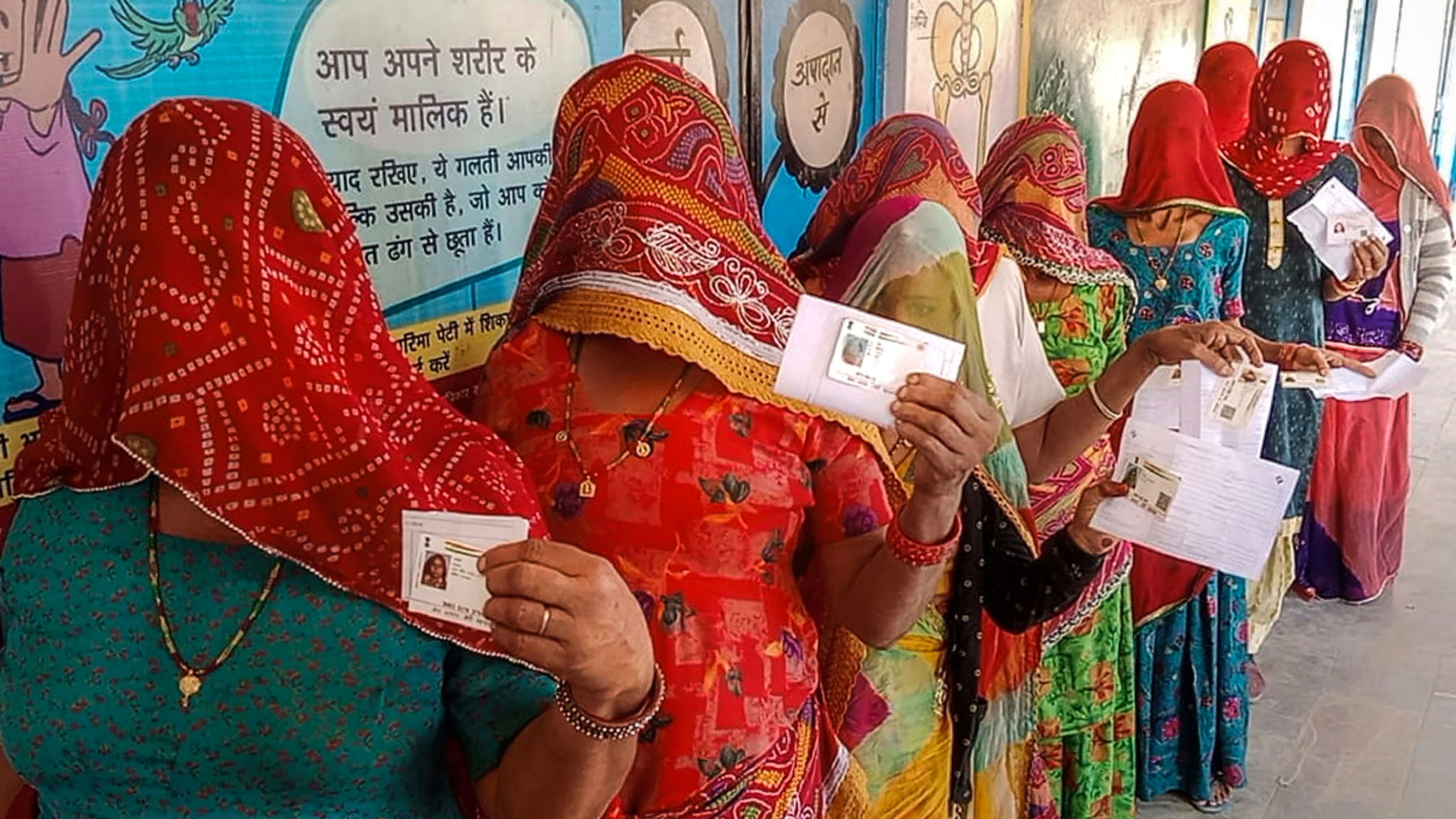
Representative image of women voters in Rajasthan.
Credit: PTI File Photo
Jaipur: Both BJP and Congress have fallen short in distributing tickets to women for the upcoming Assembly polls, despite their vociferous support to politically empower women through the Women Reservation Bill (Nari Shakti Vandan Adhiniyam ).
None of the two major parties have kept the one-third seats reservation policy for women in mind, while distributing the tickets for the Assembly elections on Nov 25, which would perhaps have set an example before the general elections in 2024.
While Congress has given 28 tickets (14 per cent) to women candidates, BJP has only distributed 20 (10 per cent) tickets to women. After the withdrawal of nominations on Nov 9, a total of 183 women candidates remain in the fray in this Assembly elections.
In 2018, Congress had given tickets to 27 women, while BJP had settled for 23.
On average, in the Assembly elections spanning 2003, 2008, and 2013, BJP has given 13 per cent tickets to women and Congress has given 11 per cent of tickets to women.
Considering the above figures, there has not been much in the percentage of ticket distribution to women.
Despite the staggering number of women voters (2.51 crore) in 2023 and their increasing voting power, parties are shying away from selecting women candidates. In the 2018 Assembly election in Rajasthan, female voter turnout was 74.66% and male turnout clocked 73.80%.
Parties, however, harp on women-centric schemes like free smartphones, subsidised gas cylinders, direct cash transfers, toilets, health cards in the name of women, welfare programmes for girl-child, and others.
In BJP, the prominent women candidates are former Chief Minister Vasundhara Raje (Jhalarapatan), Diya Kumari (Vidyadhar Nagar), Anita Bhadel (Ajmer South), Jyoti Mirdha (Nagaur) and Siddhi Kumari ( Bikaner East). Congress has fielded Archana Sharma (Malviya Nagar), minister Mamta Bhupesh (Sikrai), Zaheeda Khan (Kaman), and Divya Maderna (Osian) among others.
While candidates like Raje, Siddhi Kumari and Diya Kumari are from royal families, Jyoti Mirdha and Divya Maderna are from political families which have influence in the region.
Congress, however, has considered at least six new women faces for the first time from these constituencies namely Draupadi Koli from Ajmer South, Ramila Meghwal Jalore, Sanjana Jatav from Kathumar, Geeta Barwar from Bhopalgarh, Anita Jatav from Hindon. Shimla Nayak from SC-dominated Anupgarh constituency.
“Although parties talk of at least 5-to-6 women candidates in their planning stage before the polls, ultimately winnability, caste factor, visibility and money power count when the actual distribution has to be done,” Laad Kumari Jain, women activist, professor and former State Women Commission chairperson told Deccan Herald.
She adds: “Despite this being the first elections after the Women Reservation Bill was passed, there has been no significant change in the ticket distribution amongst the women, BJP has come down to 20 and Congress has barely given to 28 women. Whereas we have been fighting for at least 60-70 tickets for women candidates. The parties only announce women-centric schemes for capturing votes but when it comes to political representation for women, all parties display a patriarchal mindset and stereotypical role for women. There is no research done about the upcoming women leaders who work tirelessly behind the scenes. They should be motivated. Many women party workers have told me ‘unless you have money power’, you are not considered for a ticket.’ Male candidates with muscle, money power, and criminal background are favoured, which is ultimately going to criminalise the whole system.”
Rehana Rayaz, Rajasthan State Women Commission chairperson, and former Mahila Morcha president, who has been trying for a ticket for herself from Churu, since the last Assembly elections told DH : “We definitely want more women representatives and have been pushing for it but many factors come into play while making the final decision. Both women and men are working hard in their regions and voters are no longer fools. They see how much work the representatives have done. The mindset is changing. Ultimately the only criterion in ticket distribution would be the work done in the constituencies, irrespective of the gender.”